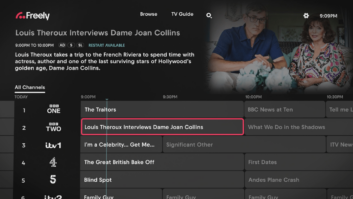
Access to the 800MHz RF band for radio microphone use, including the dedicated Channel 69, is ending. The EU is re-allocating the spectrum to 4G mobile broadband use. In the UK, the switch off was held back to allow full wireless microphone coverage at the Olympics, but now that’s over an auction is expected by the end of the year. The frequencies are being made available due to the switch off of broadcasters’ analogue transmission spectrum, but couldn’t simply be re-allocated to broadcast use because there is now so much commercial interest in wireless RF spectrum. “The last 15 years has seen the explosion of mobile telephones, and then, in rapid succession, the demand to have fast wireless internet access available on these devices. It’s fair to say that with the increasing use of social media on smartphones alongside ‘traditional’ mobile phone use, RF spectrum has never before been in such widespread everyday use by the general public. Consequently, rights and licenses to use that spectrum are now big business in a way they never were before,” according to Tuomo Tolonen, Applications and Product Manager, Shure Distribution UK (pictured). Therefore, when the UK government announced the analogue-to-digital television switchover in 2003, it was immediately followed by plans to auction off the rights to use those portions of the RF spectrum that would no longer be needed for analogue TV signals after 2012 – UHF TV Channels 31-40 (550-630MHz) and 63-68 (806-854MHz). The income the auction is expected to generate became known as the Digital Dividend. This was of only passing interest to the creative AV and broadcast industries (or PMSE – Programme Making & Special Events) until 2007, when it became apparent that the UK regulator, Ofcom, was also thinking about auctioning off Channel 69 (854-862MHz), which was not used for broadcast of analogue TV and had been dedicated for use by radio microphones. “It had been understood that Channel 69 would not be affected by the Digital Switchover, but the World Radio Conference in 2007 changed everything. The newly announced European plan was to completely clear the so-called ‘800MHz band’ of spectrum (which covers 790-862MHz) for eventual use by next generation 4G mobile broadband services across the EU, leading to Europe-wide economies of scale for the providers of such services,” explained Tolonen “It was thus no surprise, that shortly thereafter, Ofcom rejigged its original plans and included both channels 61 and 62 along with Channel 69 in the auction process, which, according to OFCOM, were in the interests of harmonisation with Europe.” This would have left users of radio microphones without a dedicated frequency block to call their own. “The result was outcry from industry technology groups who rightly claimed that it wouldn’t be possible to stage modern musicals without radio mics, but the problem also had serious repercussions for anyone working in the AV, electronic news-gathering, broadcast, film, events and live music industries — basically anyone making extensive use of radio microphones or in-ear monitoring systems.” It led to intensive political lobbying from BEIRG, the British Entertainment Industry Radio Group, and the specially formed Save Our Sound UK campaign, as well as high-profile individuals and industry bodies representing equipment manufacturers. These won some concessions, and the PMSE industry is in a better situation now because of it. Ofcom agreed to grant radio microphones a new dedicated operating band at Channel 38 (606-614MHz), plus access to two bands of interleaved spectrum between 470-550MHz and 606-790MHz. “Permission for radio mic users to continue using Channel 69 and the rest of the 800MHz band was also permitted until December 31st this year, after some earlier indications that the clearance of the 800MHz band by PSME might have to be complete earlier in 2012. And thanks to the application of industry pressure, some Government-backed financial compensation was eventually forthcoming for affected users although this wasn’t nearly as far-reaching as some industry bodies would have liked. Finally, PMSE equipment in the UK is now being sold on frequencies that will be available for the foreseeable future, after an interim period when, not surprisingly, sales of wireless mic systems came to a near standstill as there was no certainty on what spectrum was available for them to use. Perhaps, after more than five years of disruption, the situation is settling down at last.” However, what broadcasters are left with won’t be ideal, and there are still some uncertainties. “Although Channel 38 is now clear for dedicated radio mic use across the UK, large-scale production companies, of the kind that cover large events and festivals, as well as theatre companies, remain concerned that they have access to far less guaranteed, interference-free spectrum than before.” Considering that contiguous UHF spectrum is essential to many productions, it is ironic, Tolonen feels, that the reason for investing in 4G mobiles is stream high-quality video and audio, but without sufficient PMSE spectrum this content might not be available to view. He is hopeful that “new wireless microphone technologies, such as Shure’s Axient or ULX-D systems, which make more efficient use of spectrum and allows users to pack more wireless channels into an 8MHz frequency band, may help in this regard.” There is also a threat that White Space Devices will cause problems with the bandwidth. “Talk of another Digital Dividend across Europe already looms on the horizon and the process of lobbying for guaranteed future spectrum access for radio mics is very much ongoing,” which is why Tolonen feels there could well be further disruption to those who rely on PMSE equipment for their living. – David Foxwww.shuredistribution.co.uk






